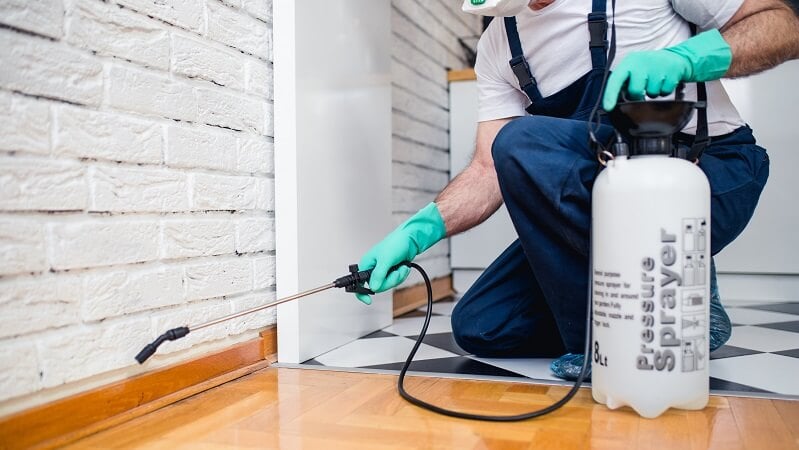Efficient Pest Control Clovis Providers: Keep Your Home Safe
Efficient Pest Control Clovis Providers: Keep Your Home Safe
Blog Article
Recognizing the Numerous Methods to Pest Control: A Comprehensive Guide

Natural Bug Control Techniques
Utilizing environmentally friendly techniques such as companion planting and biological bug control is vital for properly taking care of parasites in farming setups. Companion growing entails expanding different crops in closeness to deter parasites, improve nutrient uptake, and enhance total plant wellness.
Biological bug control involves introducing all-natural killers or virus to regulate pest populations. Ladybugs, for instance, feed on aphids, regulating their numbers without the need for chemical pesticides. An additional example is making use of Bacillus thuringiensis (Bt), a bacterium that targets details insect bugs while being safe to humans, animals, and advantageous pests.
These eco-friendly methods not just minimize the dependence on synthetic chemicals but also help preserve biodiversity and dirt wellness. By integrating all-natural pest control strategies right into farming practices, farmers can achieve sustainable bug administration while decreasing unfavorable influence on the setting.

Chemical Pest Control Solutions
In addition to natural parasite control techniques, the utilization of chemical pest control options plays a significant role in properly handling pest populations in agricultural environments. Chemical pest control remedies are developed to target specific parasites that may trigger comprehensive damage to crops. These services typically consist of synthetic chemicals that are created to eliminate insects rapidly and successfully.
One of the essential benefits of chemical pest control options is their effectiveness in regulating parasite invasions widespread. Farmers can use these solutions using various approaches such as splashing, fumigation, or seed treatment to safeguard their crops from harmful bugs, weeds, and conditions. Additionally, chemical bug control options are relatively very easy to use and can offer rapid outcomes, aiding farmers safeguard their returns and reduce economic losses.
Nevertheless, it is necessary to use chemical pest control options judiciously to minimize prospective negative influences on the setting, non-target organisms, and human health. Correct application techniques, adherence to safety and security guidelines, and normal tracking are crucial to ensure the accountable use chemical insect control options in farming practices.
Organic Bug Control Approaches
Biological insect control approaches useful content leverage all-natural predators or pathogens to handle pest populations in agricultural setups efficiently. One common organic control approach is the intro of all-natural opponents, such as ladybugs or parasitical wasps, to target certain insects.
An additional organic control technique involves using virus like fungis, microorganisms, or infections to contaminate and eliminate parasites. Overall, biological pest control methods provide a lasting and targeted remedy to pest monitoring in farming.
Integrated Insect Management (IPM)
Integrated Insect Administration (IPM) is a thorough method that combines various parasite control approaches to successfully take care of and minimize pest populaces in farming systems. IPM focuses on long-lasting prevention of bugs through a combination of biological, cultural, physical, and chemical control approaches. By integrating these different methods, IPM intends to minimize dependence on chemical pesticides, minimize environmental effect, and promote sustainable insect management methods.
One trick facet of IPM is making use of organic controls such as natural killers, parasites, and pathogens to control insect populaces. This approach takes advantage of the power of nature to maintain an equilibrium in between pests and their natural enemies without creating damage to the atmosphere.
In addition, IPM involves social practices like plant rotation, environment, and hygiene adjustment to produce undesirable conditions for pests and interrupt their life process. Physical controls such as composts, obstacles, and traps are additionally made use of to avoid parasite infestations.
Physical and mechanical Insect Control Techniques
Making use of non-chemical methods, such as physical and mechanical bug control strategies, is an important element of extensive bug management approaches, building on the structure of Integrated Insect Administration's alternative technique. Mechanical insect control involves making use of physical obstacles or catches to prevent parasites from accessing and damaging plants or structures. This approach can include methods like mounting displays on windows, utilizing row covers in agriculture, or utilizing sticky traps to catch insects.
Physical insect control approaches, on the other hand, emphasis on directly getting rid of insects through physical methods. Using heat therapies to get rid of bed insects or vacuuming up bugs like crawlers or ants can be reliable means to take care of infestations without the use of chemicals. By including these physical and mechanical parasite control methods right into an Integrated Insect Management plan, experts and individuals can minimize dependence on pesticides while still successfully managing pest straight from the source populaces and minimizing damages.
Final Thought

In addition to all-natural bug control approaches, the usage of chemical insect control solutions plays a significant role in efficiently taking care of pest populaces in agricultural settings.One of the essential advantages of chemical parasite control services is their performance in managing bug invasions on a big range.Integrated Bug Management (IPM) is an extensive strategy that integrates numerous bug control methods to effectively take care of and reduce pest populations in farming systems.Making use of non-chemical approaches, such as physical and visit this website mechanical pest control methods, is a vital element of comprehensive pest monitoring techniques, building upon the structure of Integrated Pest Monitoring's holistic strategy. By integrating these mechanical and physical pest control techniques into an Integrated Insect Monitoring plan, professionals and individuals can lower dependence on chemicals while still effectively minimizing and taking care of pest populations damage.
Report this page